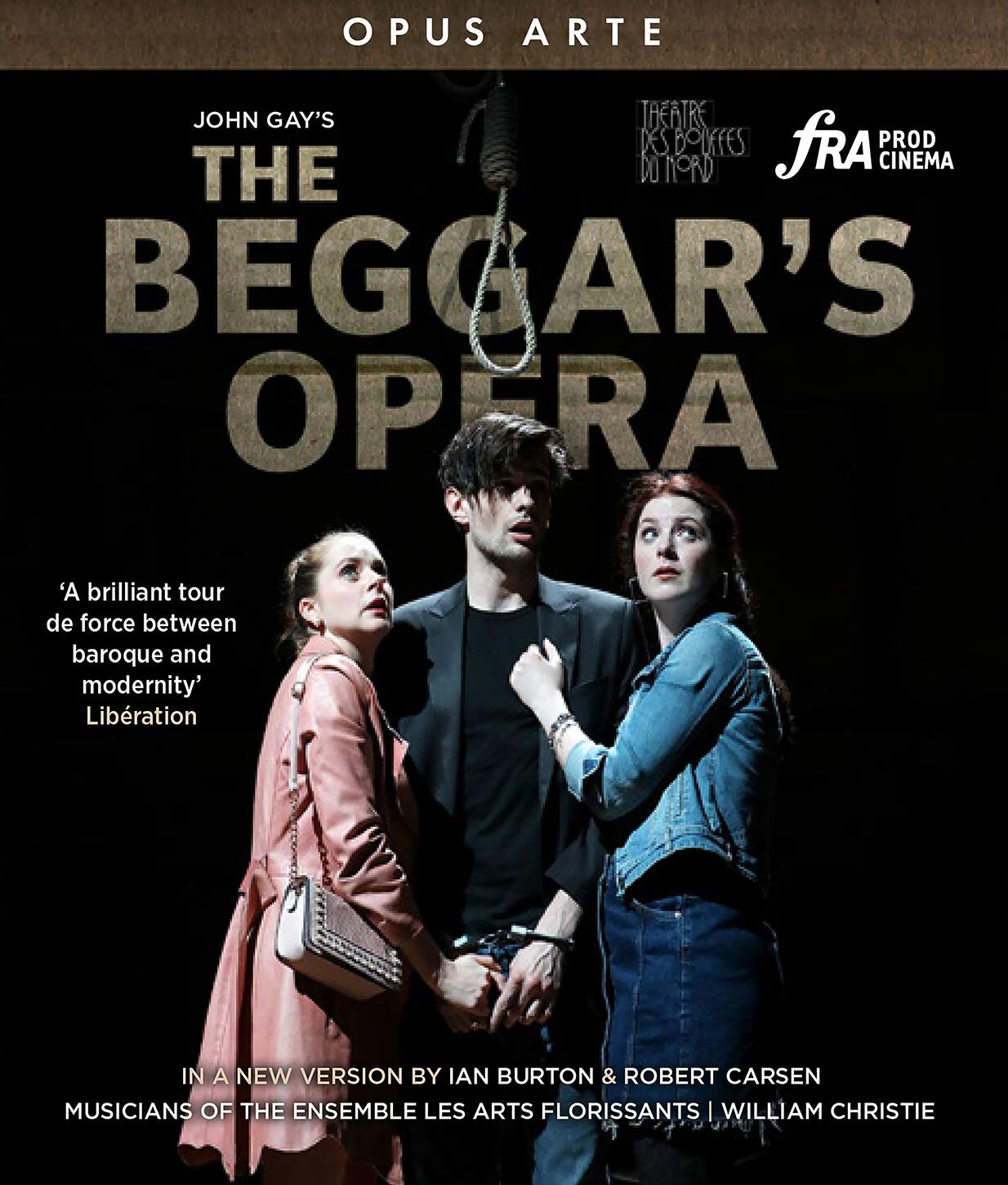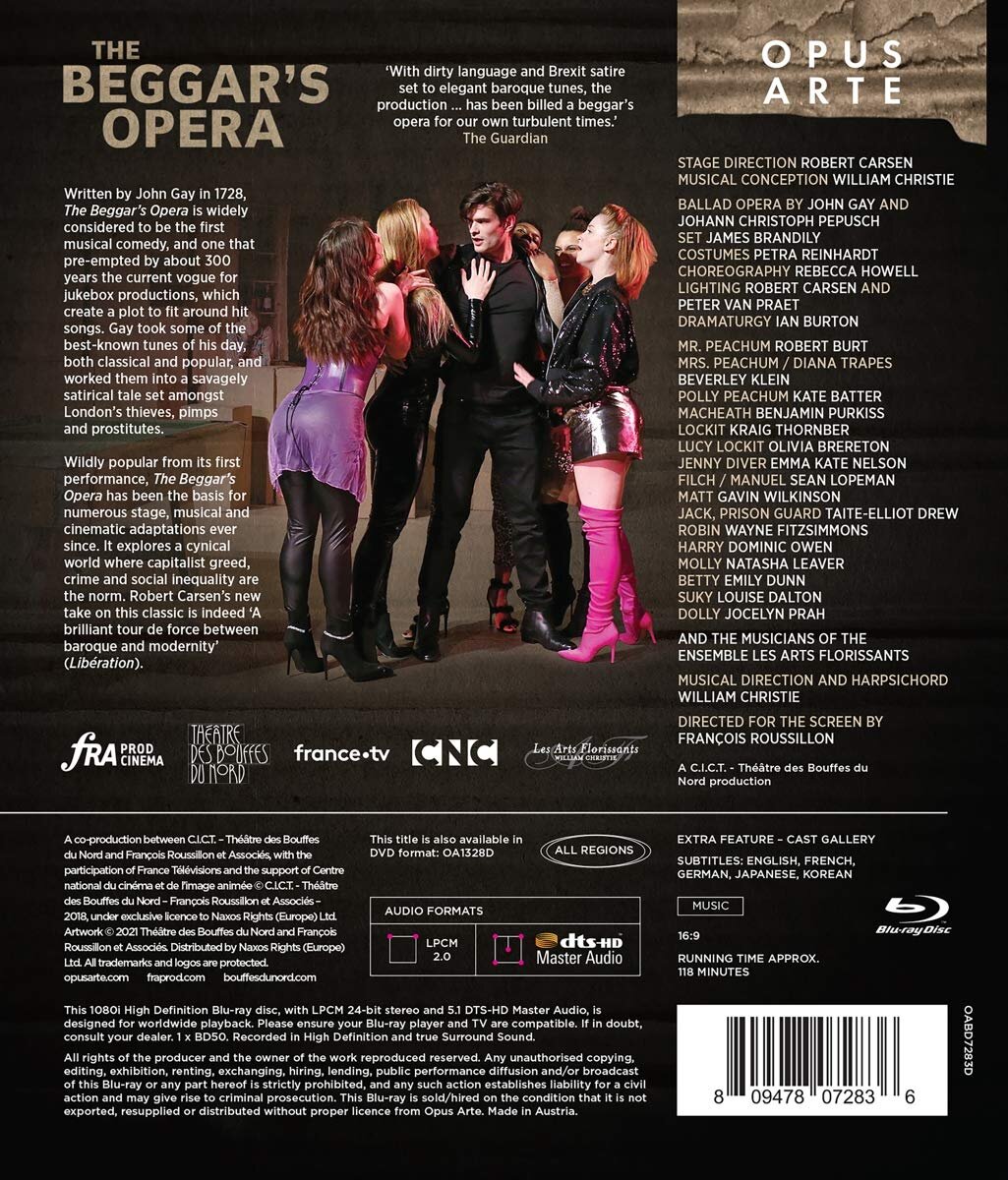

The Beggar’s Opera is a ballad opera written in 1728 by John Gay and Johann Christoph Pepusch. This title is a new version by Ian Burton and Robert Carsen with musical conception by William Christie. Directed 2018 by Robert Carsen at the Théâtre des Bouffes du Nord in Paris. Stars Robert Burt (Mr. Peachum), Beverley Klein (Mrs. Peachum/Diana Trapes), Kate Batter (Polly Peachum), Benjamin Purkiss (Macheath), Kraig Thornber (Lockit), Olivia Brereton (Lucy Lockit), Emma Kate Nelson (Jenny Diver), Sean Lopeman (Filch/Manuel), Gavin Wilkinson (Matt), Taite-Elliot Drew (Jack, Prison Guard), Wayne Fitzsimmons (Robin), Dominic Owen (Harry), Natasha Leaver (Molly), Emily Dunn (Betty), Louise Dalton (Suky), and Jocelyn Prah (Dolly). William Christie conducts the Ensemble les Arts Florissants from his harpsichord. Sets by James Brandily; costumes by Petra Reinhardt; choreography by Rebecca Howell; lighting by Robert Carsen and Peter van Praet; dramaturgy by Ian Burton. Directed for TV by François Roussillon; Executive Producer was Toni Hajal; music producer was Mireille Faure. Sung in English. Released 2021, disc has 5.1 dts-HD Master Audio sound. Grade: A+
Gay’s Beggar’s Opera was the first ballad opera. The ballad opera expropriates all kinds of familiar music to mock Italian opera. Gay’s creation survives as the only ballad opera performed today. It’s still popular, per Wikipedia, thanks to its savage satirical treatment of “politics, poverty, injustice, and corruption at all levels of society.” Since 1728, many adaptations the Beggar hit the boards. The most famous offspring is the 1928 Die Dreigroschenoper (The Threepenny Opera) by Bertolt Brecht and Kurt Weill.
To get a feel for the style of Gay’s original conception, see the painting below by William Hogarth, the famous satirical painter:
If you want to do a modern Beggar, where do you begin? Well, start with a beggar’s theater—the most run-down, pitiful venue you can find. If you remember our story about Traviata: You Deserve a Better Future, you would know what to do: rent the Théâtre des Bouffes du Nord in Paris. The Bouffes is maybe the worst theater standing now in any country that has a fire marshal:
What do you do to this ugly ruin? Clever Robert Carsen snapped an answer: cover the whole stage area with cardboard boxes stacked in Mr. Peachum’s warehouse! Move the boxes around to make different sets. You don’t need to rent chairs and music stands for the orchestra—boxes will do for this too. A bunch of small opera houses financed this show, so the mise-en-scène has to be cheap to move. Well, after knocking down the boxes, cram all of your set and props (except a pool table) in a big pick-up truck! The cast can find some of the costumes in a rubbish bin and the rest at home. That’s how beggars produce an opera!
Most of the libretto is spoken leading to frequent songs. Beggars can’t pay opera singer fees. The solution is to hire actors who can carry a tune, dance, and maybe even do acrobatic tricks. Below, behold the beggar’s chorus:
Now we meet Mr. Peachum (Robert Burt) in his warehouse. Head of the mob, he’s a Renaissance man—expert in fencing (buying stolen goods), pimping, organized begging, prostitution, illegal drugs, moonlight taverns, child trafficking, bribing, bogus documents, money laundering, forgery, and serving as mouthpiece (lawyer and agent) for crooks:
Below Peachum goes through his roster of thugs and their specialties:
Next below we get a better shot of William Christie at the harpsichord and most of Les Arts Florissants. The musicians relish the beggar life playing on ancient instruments. Singing below is Mrs. Peachum (Beverly Klein). The music is (reconstructed) baroque similar to what Gay and Pepusch would have heard in 1728. The plot hasn’t changed. Much of the original text was carried over by Burton and Carsen with updated slang. The writers lace the libretto with topical references (some of which are already out-of-date). Also new are many three-and-four-letter-vulgar words in British English—today we are not used to censorship on the stage:
The Peachums have a daughter, Polly (Kate Batter). The Peachums naturally hope that Polly will marry up into gentry:
Peachum hired Macheath as field captain for the mob. The Peachums have just learned, to their horror, that Polly and Macheath secretly have gotten hitched. Forget about marrying up! But the marriage does present an opportunity. Macheath was previously in prison serving time under the warden Lockit. Macheath seduced Lucy, Lockit’s daughter, who helped him escape. If Polly could lure her husband into an ambush, the Peachums would claim a fat reward for the Macheath’s capture and execution!
Now we meet Macheath (Benjamin Purkiss). All women lust after him:
Macheath is good at networking. See his gang of thugs below drinking in Diana Trapes’s tavern. Look closely at the screenshot on the right below and you can see a member of the chorus doing a back-flip off the pool table:
Macheath also has a posse of prostitutes. They clamour for Macheath’s attention. Macheath doesn’t know, however, that Peachum hired the girls to get Macheath drunk enough for Lockit to recapture him. If Macheath hangs, it will be a good week’s work for Peachum and the girls:
Macheath is betrayed and is back in jail:
Now we meet Lucy (Olivia Brereton ). You will recall that Macheath seduced Lucy during an earlier stint in jail. He also promised to marry her. Now Lucy is pregnant with Macheath’s child:
Lucy steals the key to Macheath’s cell out of her father’s pocket and helps Macheath escape again! Now everybody is chasing after Macheath. Polly and Lucy aren’t sure if they should be allies or enemies:
Lucy invites Polly for a drink, where Lucy plans to poison her rival. Each girl feigns loss of interest in Mac as each desperately tries to shake off the other. Clever material from Ian Burton and Carsen becomes hilarious as delivered by these skilled actresses. The ballad opera now mocks today’s soap opera:
Macheath is free, but broke. He gets an invitation to a fancy gaming house, where he has a chance to fill his wallet fast. The trip to the casino turns out to be another blunder for Macheath He’s caught again:
Now both girls find Macheath at the prison, and they are joined by 4 other women with babies fathered by him! The hangman’s noose is right above his head—this time Mac is doomed for sure:
But wait! The country is going through a political upheaval!
Happy ending! There is a new Prime Minister and Macheath is appointed Minister of Justice! He appoints all his friends to government jobs . . .
Even though this production started off in a beggar’s theater with cheap sets, props, and costumes, everything else is first class. This is basically a play with actors who also dance to athletic choreography by Rebecca Howell and manage to sing well enough to be enjoyed. The libretto as well as the choice and content of the songs have been skillfully updated to be understandable today. Carsen’s taut, hard-driving directing engages you throughout. At the same time, Christie’s baroque sound world keeps you aware that you are watching a monument of the music-theater literature. Video content, PQ, and SQ are fine.
An unprepared viewer can easily enjoy this. Those in the know will pick up on the satire of Italian opera and political views embedded in the work. This was a big hit on the road in theaters all over Europe. Paul Corfield Godfrey, writing for musicweb-international.com says “for sheer enjoyment this video is going to be hard to beat.” Grade: A+
PS: Don’t get confused. There are several Blu-rays and DVDs available of SD videos and old movie productions of The Beggar’s Opera. Subject title is the only HD recording with surround sound. Let’s hope someone will make an HDVD of the Benjamin Britten version. Die Dreigroschenoper remains the greatest work of all in the ballad opera genre. I just listened again (July 2021) to the Lotte Lenya LP recording of Die Dreigroschenoper (Odyssey Y2 32977). Somebody has to do this with HD video/surround sound in Weimar German cabaret style!
Here’s a trailer about subject title from Les Arts Florissants:
OR



























